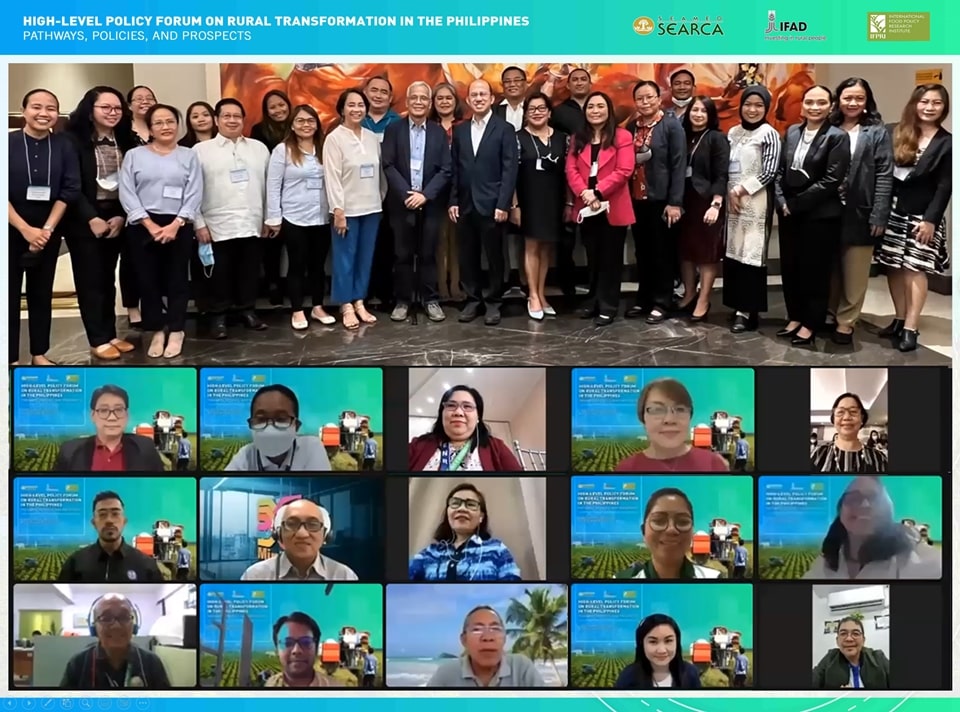 Forum organizers/partners, and in-person & online participants
Forum organizers/partners, and in-person & online participants
QUEZON CITY, PHILIPPINES – The Southeast Asian Regional Center for Graduate Study and Research in Agriculture (SEARCA), in partnership with the International Fund for Agricultural Development (IFAD)-Philippines and the International Food Policy Research Institute (IFPRI), organized the High-Level Policy Forum on Rural Transformation in the Philippines: Pathways, Policies, and Prospects on 8-9 September 2022 at Luxent Hotel and via Zoom.
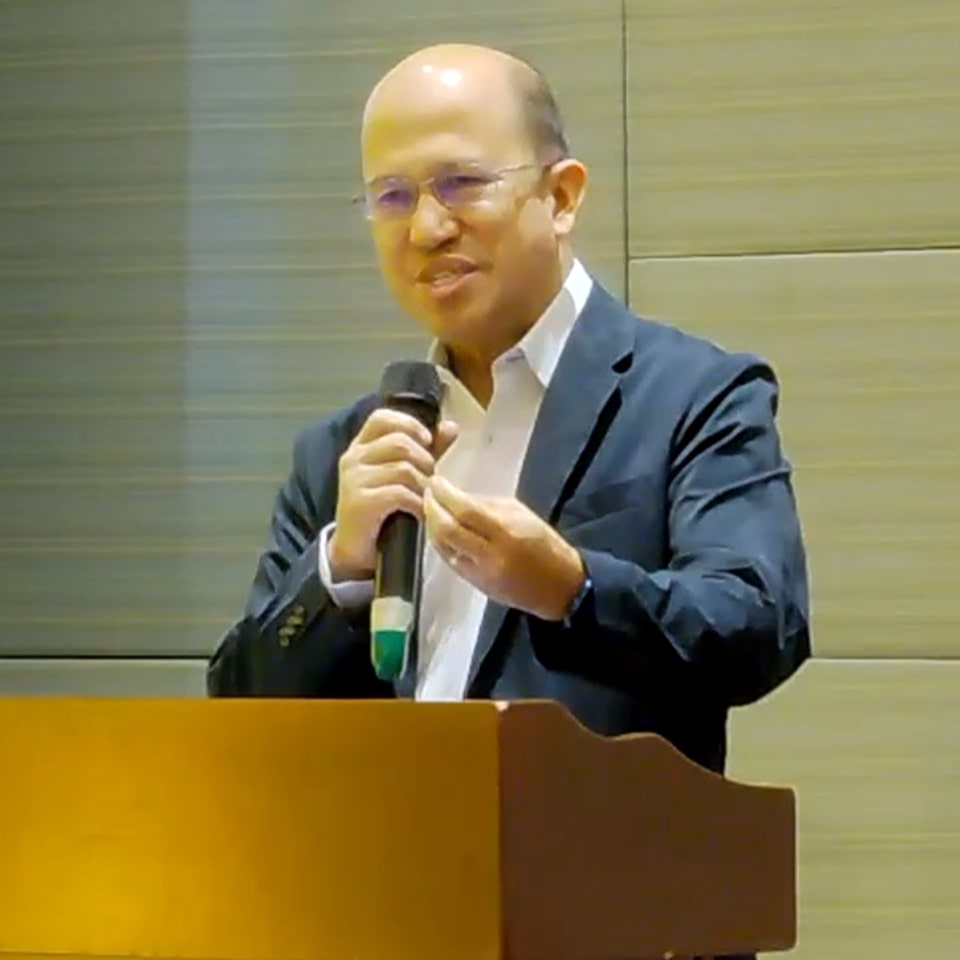 Dr. Glenn B. Gregorio, SEARCA Director, welcomed both in-person and online participants to the forum. In his remarks, Dr. Gregorio reiterated the objectives of the forum and shared some notable involvements of the Center in the efforts in agricultural and rural development. Among which is the Asian Development Bank (ADB)-commissioned project with SEARCA on the development of National Agriculture and Fisheries Modernization and Industrialization Plan 2021-2030, highlighting a nine-strategy investment which can be achieved through government-industry partnership. Dr. Gregorio also found the forum to be in line with SEARCA’s 11th Five-Year Plan with the theme Accelerating Transformation Through Agricultural Innovation, or ATTAIN, and that the key to achieving the goals of these initiatives is through strategic partnerships. He also thanked IFAD and IFPRI for their continuous support and collaboration with SEARCA and enjoined the stakeholder-attendees to actively participate in the discussions and collaborate with each other toward a common end goal which is to help the farmers.
Dr. Glenn B. Gregorio, SEARCA Director, welcomed both in-person and online participants to the forum. In his remarks, Dr. Gregorio reiterated the objectives of the forum and shared some notable involvements of the Center in the efforts in agricultural and rural development. Among which is the Asian Development Bank (ADB)-commissioned project with SEARCA on the development of National Agriculture and Fisheries Modernization and Industrialization Plan 2021-2030, highlighting a nine-strategy investment which can be achieved through government-industry partnership. Dr. Gregorio also found the forum to be in line with SEARCA’s 11th Five-Year Plan with the theme Accelerating Transformation Through Agricultural Innovation, or ATTAIN, and that the key to achieving the goals of these initiatives is through strategic partnerships. He also thanked IFAD and IFPRI for their continuous support and collaboration with SEARCA and enjoined the stakeholder-attendees to actively participate in the discussions and collaborate with each other toward a common end goal which is to help the farmers.
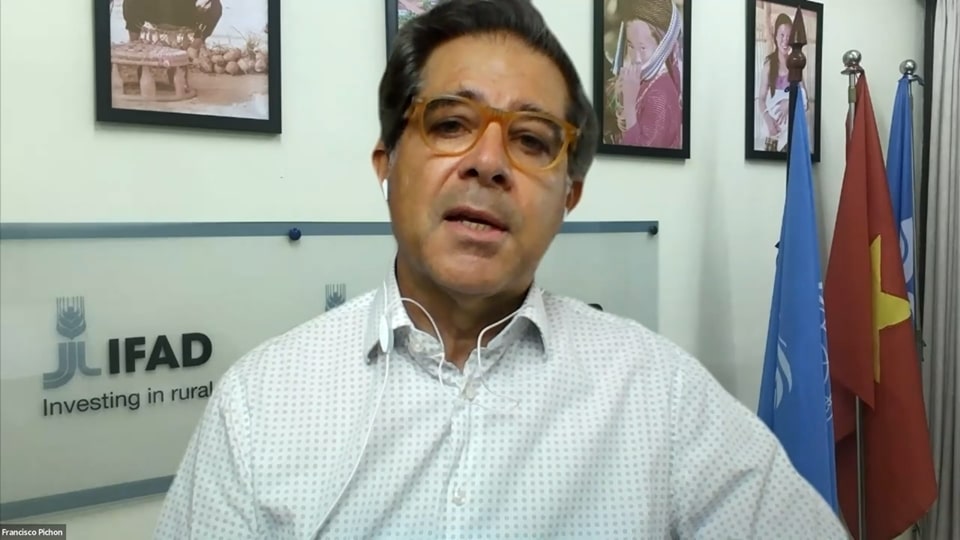
In his message, Dr. Francisco Javier Pichon, Head of Mekong Hub, Asia and the Pacific Division of IFAD, shared the institutions’ launched networks as offshoots of the grants and programs they had and have been supporting. He emphasized that these networks have become a “standard feature” of ensuring that all the lessons learned from IFAD-funded projects and initiatives can be used in national development plans, policy discussions and formulation, country strategies, among others. Dr. Pichon also shared some of these networks’ actual accomplishments, such as being able to quickly respond through rapid assessments. IFAD’s experience in mobilizing these networks may therefore be used as reference in adopting best practices identified. Moreover, this experience can be helpful in anticipating challenges that may be faced by newly-launched networks of experts, such as the Network of Policy Advisors and Analysts in the ASEAN Region (NePAAA), which was the focus of Day 2 of the forum.
Rural Transformation in the Philippines
The first day of the forum aimed to tackle the state of rural transformation in the country and gather recommendations from identified stakeholders from relevant Philippine government agencies, representatives from development and research organizations and think tanks, civil society and farmers organizations, the academe, and the private sector.
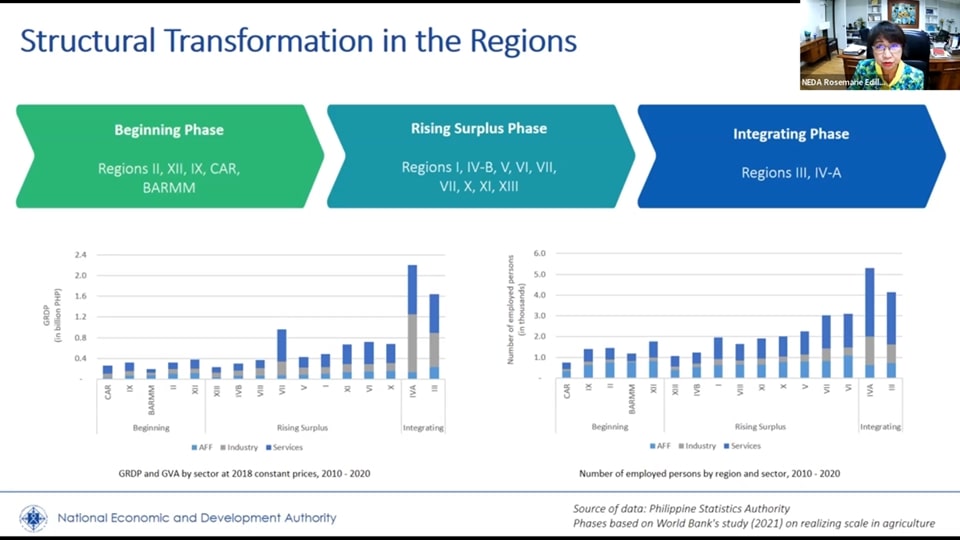
A keynote presentation from Dr. Rosemarie G. Edillon, Undersecretary for Policy and Planning Group of the National Economics and Development Authority (NEDA), set the tone of the forum and provided an overview and status of rural transformation in the regions of the country. From Usec. Edillon’s
presentation, only 3 of 16 regions have exhibited high rural transformation, while most regions in the country remain at the early rural transformation stages, exhibiting slow shifts toward modern agriculture and off-farm employment.
Ms. Bernice Anne D. De Torres, Program Specialist of SEARCA’s Research and Thought Leadership Department (RTLD), provided the details of the forum and set the expectations from the participants and the outputs coming out of two-day activity.
Assistant Professor Karen P. Quilloy of the University of the Philippines Los Baños (UPLB), also the Project Leader of the Philippine component of the IFAD-funded project on rural transformation implemented by the Institute of Geographic Sciences and Natural Resources Research (IGSNRR) with SEARCA, presented the project’s typology paper on regional rural transformation in the country and the critical role played by institutions, policies, and investments (IPI) and how their importance varied depending on the stage of rural transformation. An open forum immediately followed aProf. Quilloy’s presentation, starting with the session discussant, Dr. Agham C. Cuevas, Professor and Dean of the College of Economics and Management (CEM) of UPLB.
The IPI also served as the specific topics of breakout group discussions, with the Institutions group facilitated by Dr. Gerlie T. Tatlonghari, Program Head of SEARCA-RTLD; Policies by Dr. Mamata Pradhan Research Coordinator of IFPRI; and Investments by Mr. Yolando C. Arban, Acting Country Programme Officer and Senior Adviser of IFAD-Philippines. Outputs, including identified issues and reforms, of each group were presented and discussed when the participants reconvened in the plenary. The body agreed that the following were the driving factors of rural transformation in the Philippines:
- Institutions: access to land under the land reform program
- Policies: agricultural wages and intra-regional price integration
- Investments: irrigation and road infrastructure
A session on ASEAN Rural Development and Poverty Eradication (RDPE) was held, highlighting a presentation by Ms. Marlene D. Ramirez, Secretary-General of the Asian Partnership for the Development of Human Resources in Rural Areas (AsiaDHRRA), with Dr. Roehlano M. Briones, Senior Research Fellow of the Philippine Institute for Development Studies (PIDS), serving as discussant. This was followed by a presentation by Mr. Abdelkarim Sma, Lead Regional Economist of the Asia and the Pacific Division of IFAD, on the rural transformation in other Asia-Pacific countries, in comparison with that in the Philippines, to identify the challenges, gaps, and opportunities toward achieving faster and more inclusive rural transformation and poverty eradication in the country. Dr. Devesh Roy, Senior Research Fellow of IFPRI, served as discussant of this session. Mr. Sma and Dr. Roy also gave tidbit information to introduce the NePAAA, which was tackled the following day.
Regional Network of Policy Experts
The forum also served as a venue for soliciting inputs to the action plan to be developed for the organization of the NePAAA Technical Working Group on Agriculture and Rural Development. In this session led by IFPRI, Dr. Roy provided the ways forward for the network which was launched in April 2022 by the IFAD-funded project on agricultural transformation and market integration in the ASEAN region, through its implementing institutions, IFPRI and SEARCA.
A research paper on Structural Transformation and Sources of Growth in Southeast Asian Agriculture was presented by Dr. Pratap S. Birthal of the Agriculture Economics and Policy Research (NCAP). Dr. Briones and Dr. Samarendu Mohanty, Asia Regional Director of the International Potato Center (CIP),
served as panelists in this session and provided their insights on the working group to be formed and the network as a whole.
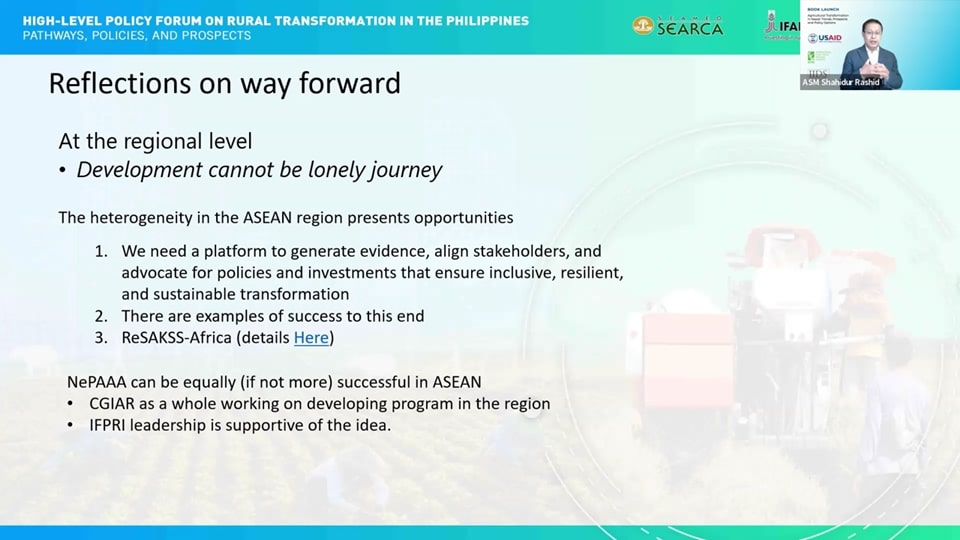
Following the NePAAA session, Dr. Shahidur Rashid, IFPRI Director-South Asia, synthesized the discussions during the two-day forum and summarized the reflections about the way forward of the activity. His talk elaborated on the concepts discussed, highlighted the state of transformation in the Philippines, and cited issues that had been and may be faced by policymakers and policy development practitioners.
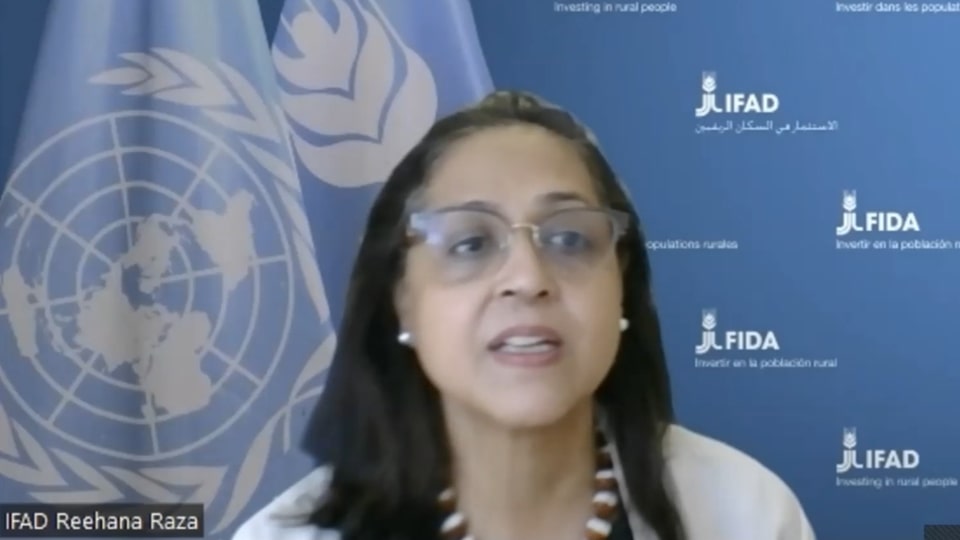
Dr. Reehana Raza, Regional Director of IFAD Asia and the Pacific Division, formally closed the forum. In her message, she emphasized the importance of strengthening capacity building of farmers and supporting non-farm-production-based activities, as well as investments in infrastructure that link the rural communities to markets, especially in the Philippines given the “geographical and physical diversity” of rural areas in the country. She reiterated that rural transformation is embedded in a broader context of structural transformation, hence, region-specific interventions must be integrated into a broader national development planning and rural development strategy that considers all aspects of rural development beyond agriculture. Dr. Raza also stated that IFAD can support the Philippine government on matters that would require undertaking the difficult processes of institutional change and reform. Additionally, IFAD will continue to serve as facilitator and enabler of multi-stakeholder participation of various sectors and organizations, as well as to assist in the efforts of including the private sector in policy dialogue and engagement with the government. Dr. Raza thanked the participants and conveyed her hope that the two-day forum’s policy dialogue will translate into meaningful action.
A proceedings report of the forum will be made available to all participants by November 2022.